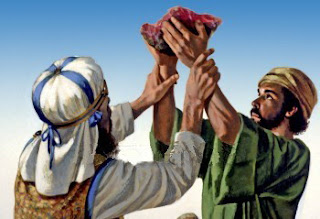Temporal Loss and Eternal Gain
On October 28, 1949, a missionary named Jim Elliot wrote the following in his journal entry, “He is no fool who gives up what he cannot keep to gain what he cannot lose.”
The above sentiment mirrors Jesus’ statement in Luke 9:24, “Whoever wants to save their life will lose it, but whoever loses their life for me will save it.” A corollary declaration appears in John 12:25, “Anyone who loves their life will lose it, while anyone who hates their life in this world will keep it for eternal life.”
Paul, the apostle, is a premier example from the period of the early church. An examination of his autobiographical account in Philippians 3:1–14 indicates that before Paul met the Messiah on the road to Damascus (Acts 9:3–16), the apostle regarded his Jewish heritage and religious zeal as a tremendous advantage. Yet, after his encounter with the risen Lord, Paul learned to consider those supposed assets as a disadvantage.
From that moment forward, because of the Redeemer’s work in the apostle’s life, he regarded his birth as a Benjamite Jew, his high standing in the Pharisee party, and even his dedication to the Mosaic Law as worthless. All that had been a profit to Paul (and that the religious legalists of his day highly esteemed), he counted as a loss because of his devotion to Savior.
Amazingly, the apostle did not feel that this forfeiture was regrettable. What he had gained in having an intimate relationship with the Messiah was of supreme worth to Paul. Indeed, everything about which he once boasted before his conversion, he now considered as refuse to be buried in a landfill or excrement to be washed down a sewer.
Religious legalists of the day insisted that believers be purified by heeding such rituals as circumcision (along with observing the Sabbath and conforming to specific dietary restrictions). Paul’s argument was that he was circumcised and did far more in his efforts to be justified under the Mosaic Law—and yet none of that was of any value to God. As scrupulously pious as the erstwhile Pharisee might have once appeared in his compulsion to keep a litany of religious rites and regulations, he now knew that a right standing with the Father could come only through trusting in the Son.
When Paul expressed his intent to “know” the Messiah, the apostle meant more than learning seemingly dry theological facts about the Savior. Paul desired to “know” Jesus in a personal way, that is, to have an ongoing relationship with Him through which Paul could experience the Redeemer working in the apostle’s life.
On one level, the Greek verb that Paul chose for “know” (ginōskō) expresses the idea of understanding and perceiving an object in an intelligent manner. Yet, on another level, the term moves beyond the philosophical to the ontological, and implies deep acquaintance, experience, and familiarity.
The implication is that Paul did not just want to know about the Messiah. The apostle also wanted to partake of the Redeemer in the fullest way possible.
Significantly, Paul wanted to know more about Jesus’ sufferings as well as His power. Romans 8:17 and 2 Corinthians 12:10 indicate that the apostle considered suffering for the Messiah to be a sought-after privilege.
Paul’s counter-intuitive perspective should not be surprising. After all, the apostle was following the self-giving, self-sacrificing example of the Savior. This observation is reinforced by comparing Philippians 3:1–14 with 2:6–11. Both passages refer to setting aside positions of privilege and power to experience temporal humiliation and eternal blessing.
Of course, what Jesus went through is infinitely more profound than anything we could ever comprehend. Paul revealed that even though the Son is eternally divine, He set aside the exercise of His kingly prerogatives to become incarnate and follow the path of lowly obedience to the Cross.
In 2:7, the apostle described three steps in Jesus’ redemptive mission: (1) He “made himself nothing”; (2) He took the “very nature of a servant”; and, (3) He was “made in human likeness.” Paul summarized Jesus’ self-emptying this way: “Though he was rich, yet for your sake he became poor, so that you through his poverty might become rich” (2 Cor 8:9).
Paul could not end his extended illustration with Jesus on the cross. Philippians 2:9 states that the place of honor that Jesus willingly forsook was given back to Him with the added glory of His triumph as the divine Warrior over sin and death. In response to Jesus’ humility and obedience, the Father supremely exalted the Son to a place where His cosmic, universal victory would eventually be recognized by every living creature.
Verse 10 discloses that every person who has ever lived would one day acknowledge Jesus’ deity and sovereignty. Also, according to verse 11, everyone would confess that Jesus is Lord. This mirrors the prophecy in Isaiah 45:23 concerning the Creator, “Before me every knee will bow; by me every tongue will swear.”
To reiterate to what was noted earlier, it took an encounter with the risen Lord Jesus to turn around Paul’s deeply misguided life. Thankfully, the apostle had learned not to dwell on his past failings (especially his rabid persecution of Jesus’ followers). Instead, Paul said “I press on” (Phil. 3:12)—by keeping his eyes of faith on an eternal future in heaven with the Savior.
Likewise, the Redeemer has summoned us to live for Him without hesitation or reservation. Verses 13 and 14 provide a welcome incentive, specifically, that the Lord would reward us with a prize of far greater worth than anything we could possibly receive (and subsequently give up) while here on earth.




